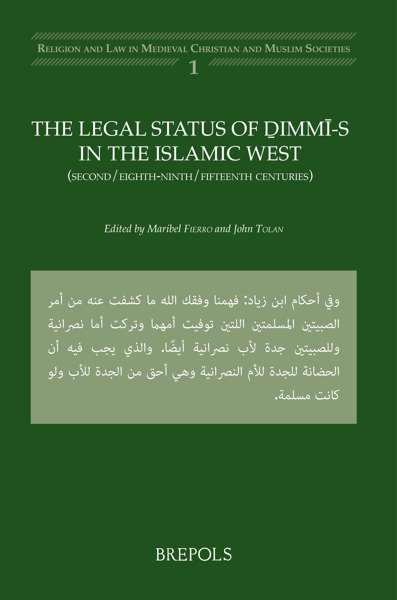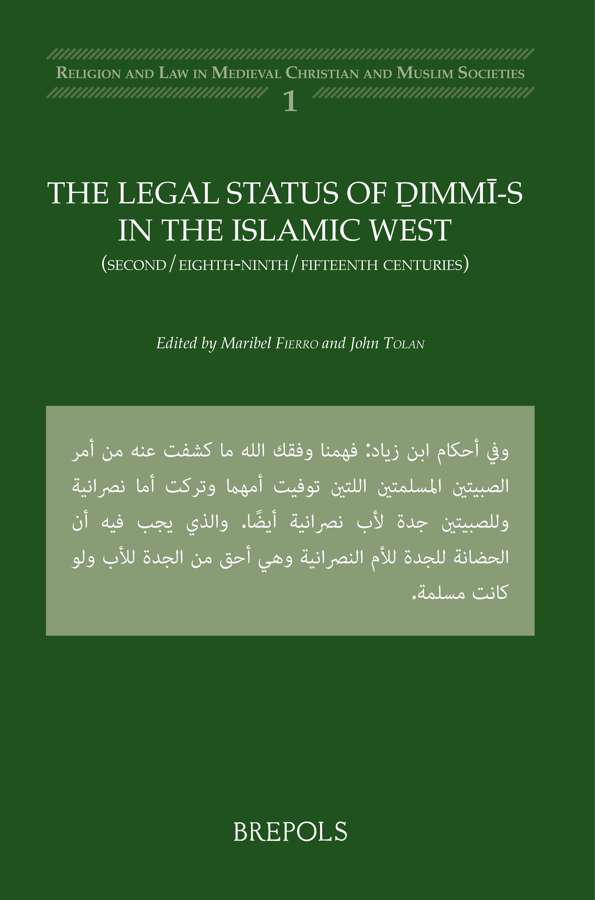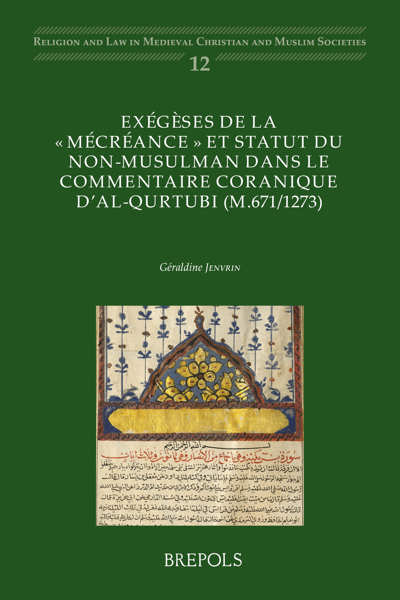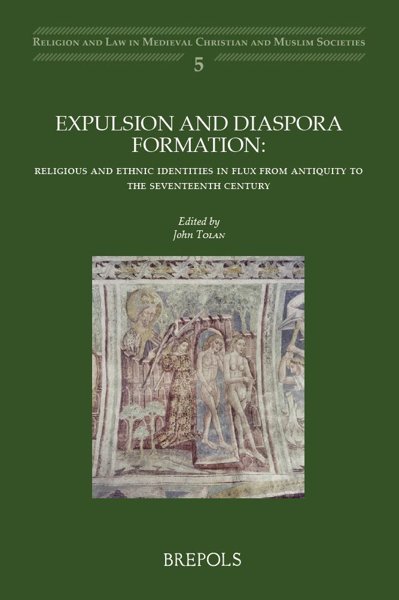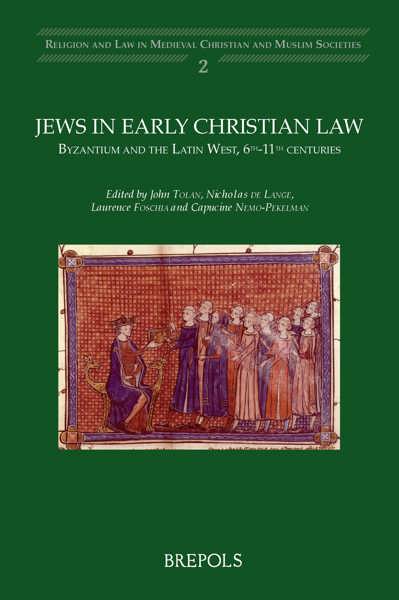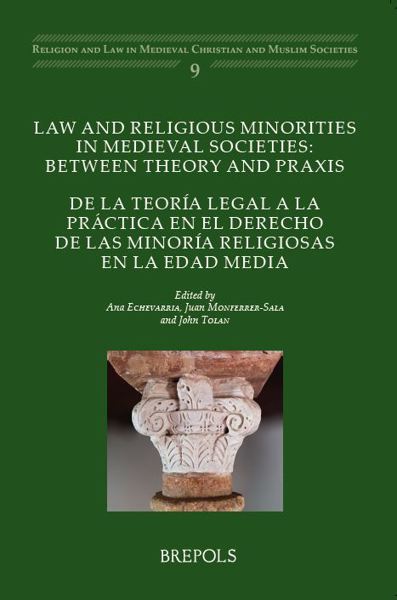
The Legal status of ḏimmī-s in the Islamic West (second/eighth-ninth/fifteenth centuries)
Maribel Fierro, John V. Tolan (eds)
- Pages: 416 p.
- Size:156 x 234 mm
- Language(s):English, French, Spanish
- Publication Year:2013
- € 90,00 EXCL. VAT RETAIL PRICE
- ISBN: 978-2-503-54854-8
- Paperback
- Available
- € 90,00 EXCL. VAT RETAIL PRICE
- ISBN: 978-2-503-54889-0
- E-book
- Available
The first monograph devoted to the legal status of religious minorities status accorded to dimmī-s ( Jews and Christians) in the Muslim law in the medieval Muslim west (the Maghreb and Muslim Spain). The articles in this volume provide numerous examples of the richness and complexity of interreligious relations in Medieval Islam and the reactions of jurists to those relations.
"Par la diversité de ses approches, ce volume aura rempli son objectif initial, offrir aux chercheurs une lecture nuancée et contextualisée du statut juridique des non-musulmans et de ses implications pratiques (...)." (Yassir Benhima, dans: Revue des mondes musulmans et de la Méditerranée, octobre 2014)
"Those interested either in Muslim law or in the faith of religious minorities under Muslim rule will certainly read this collaborative volume with great enthusiasm and curiosity. The book fills a significant gap, since no similar work discussing the legal status of dhimmī-s in the Maghreb has ever been composed. (...) This volume is an indispensable tool to the study of religious minorities in the Islamic West. It is the great number of sources studied and the quantity of different scholarly approaches that makes this book so extraordinarily precious and interesting." (Dora Zsom, in: Studia Islamica, 110, 2015, p. 110-115)
"Sans avoir rendu compte de toutes les contributions qui forment la matière de cet ouvrage de très haute qualité, dense et richement documenté, nous dirons en conclusion qu’il représente un outil de références pour les spécialistes dans le domaine des études sur les minorités, au Maghreb et en Espagne en particulier. C’est un travail remarquable, précieux à tous les égards, qui propose des approches diverses des sources et des analyses fécondes, même lorsqu’elles nous semblent osées. Il contient en germe de nombreux débats fructueux pour l’avenir. On ne peut que souhaiter que d’autres entreprises similaires voient le jour. Que ses coéditeurs en soient vivement remerciés." (Moez Dridi, dans: Bulletin critique des Annales islamologiques, 29, 2014, p. 90-95)
"It is worth noting in the work as a whole how the enormous amount of literature on legal practices continues to provide interesting new data on interfaith relations and limits. All the legal argumentation contained in the papers softens the strict principles governing the relations of Muslims with non-Muslims and reveals curious, significant day-to-day details of this relationship. It is also interesting to see the comparison the various authors make between the doctrines of the different Mālikī jurists and the diachronic analysis of the legal argumentation they describe." (Eva Lapiedra Gutiérrez, in: Medieval Encounters, 21 (2015), p. 525-528)
"The methodological sophistication and wealth of source material evident in this volume make it important reading for anyone interested in inter-religious relations and the history of legal cultures and communities in the Islamic West and the Mediterranean." (Camilo Gómez-Rivas, in Islamic Law and Society, 23, 2016, p. 311)
The studies brought together in this volume provide an important contribution to the history of ḏimmī-s in the medieval dār al-islām, and more generally to the legal history of religious minorities in medieval societies. The central question addressed is the legal status accorded to ḏimmī-s (Jews and Christians) in the Muslim law in the medieval Muslim west (the Maghreb and Muslim Spain). The scholars whose work is brought together in these pages have dealt with a rich and complex variety of legal sources. Many of the texts are from the Mālikī legal tradition; they include fiqh, fatwā-s, ḥisba manuals. These texts function as the building blocks of the legal framework in which jurists and rulers of Maghrebi and Peninsular societies worked. The very richness and complexity of these texts, as well as the variety of responses that they solicited, refute the textbook idea of a monolithic ḏimmī system, supposedly based on the Pact of ‘Umar, applied throughout the Muslim world. In fact when one looks closely at the early legal texts or chronicles from both the Mashreq and the Maghreb, there is little evidence for a standard, uniform ḏimmī system, but rather a wide variety of local adaptations. The articles in this volume provide numerous examples of the richness and complexity of interreligious relations in Medieval Islam and the reactions of jurists to those relations.
THE LEGAL STATUS OF ḎIMMĪ-S IN THE ISLAMIC WEST
Edited by Maribel Fierro and John Tolan
Summary
1. FIERRO, Maribel, “Introduction”
I. Legal views on ḏimmī-s.
2. MÜLLER, Christian, “Non-Muslims as part of Islamic law: Juridical casuistry in a fifth/eleventh century law manual”.
3. CHÉRIF, Mohamed, « Encore sur le statut des ḏimmī-s sous les Almohades ».
II. The early period: submission and adaptation.
4. CARMONA, Alfonso, “Doctrina sobre la ğizya en el Occidente islámico pre-moderno”.
5. NEF, Annliese, “Le statut des ḏimmī-s dans la Sicile aghlabide (212/827-297/910)”.
6. GARCIA SANJUÁN, Alejandro, “La formación de la doctrina legal mālikí sobre lugares de culto de los ḏimmíes”.
7. MOLÉNAT, Jean-Pierre, « La fatwā sur la construction des églises à Cordoue au IVe/Xe siècle ».
8. AILLET, Cyrille, « La construction des frontières interconfessionnelles: le cas des chrétiens d’al-Andalus dans les sources juridiques (IIe/VIIIe-VIe/XIIe s.) ».
9. VIGUERA, María Jesús, “Dimmíes en crónicas de al-Andalus: intereses y estrategias reflejadas en al-Muqtabis II-1 de Ibn Ḥayyān”.
III. Exploring legal casuistry.
10. BOUCHIBA, Farid, « Cimetières et opérations funéraires en al-Andalus : Ḏimmīs et non-musulmans face à la mort. Étude de cas à partir du Kitāb al-ğanā’iz de la Mustaḫrağa d’al-‘Utbī (m. 255/869) et de son commentaire al-Bayān wa l-taḥṣīl du Qāḍī Ibn Rušd al-Ğadd (m. 520/1126) ».
11. HERNÁNDEZ, Adday, “La compraventa de vino entre musulmanes y cristianos ḏimmíes a través de textos jurídicos mālikíes del Occidente islámico medieval”.
12. OULDDALI, Ahmed , « Recevabilité du témoignage du ḏimmī d’après les juristes mālikites d’Afrique du Nord ».
IV. Going to court.
13. VOGUET, Elise, « Les communautés juives du Maghreb central à la lumière des fatwa-s mālikites de la fin du Moyen Âge ».
14. RUSTOW, Marina, “The legal status of ḏimmī-s in the Fatimid East: A view from the palace in Cairo”.
V. The non-Muslims’ sources.
15. WASSERSTEIN, David, “Families, Forgery And Falsehood: Two Jewish Legal Cases From Medieval Islamic North Africa”.
16. ECHEVARRIA, Ana, “Jews as heretics in the eyes of an Arabized Christian community”.
17. TOLAN, John, “Conclusions”
Sources and bibliography
Index
